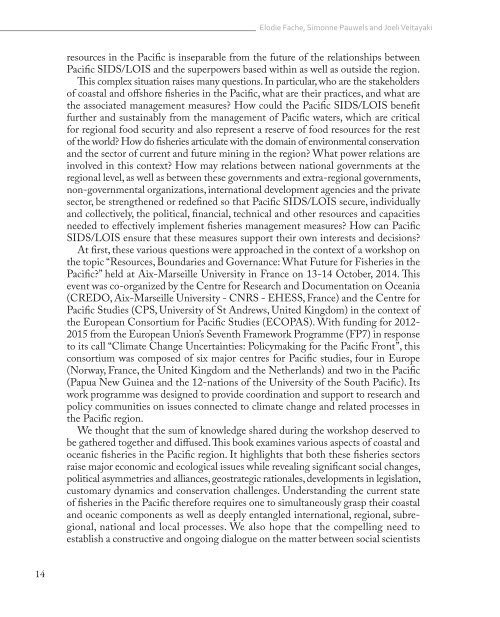Fisheries in the Pacific
Fisheries_in_the_Pacific
Fisheries_in_the_Pacific
You also want an ePaper? Increase the reach of your titles
YUMPU automatically turns print PDFs into web optimized ePapers that Google loves.
Elodie Fache, Simonne Pauwels and Joeli Veitayaki<br />
resources <strong>in</strong> <strong>the</strong> <strong>Pacific</strong> is <strong>in</strong>separable from <strong>the</strong> future of <strong>the</strong> relationships between<br />
<strong>Pacific</strong> SIDS/LOIS and <strong>the</strong> superpowers based with<strong>in</strong> as well as outside <strong>the</strong> region.<br />
This complex situation raises many questions. In particular, who are <strong>the</strong> stakeholders<br />
of coastal and offshore fisheries <strong>in</strong> <strong>the</strong> <strong>Pacific</strong>, what are <strong>the</strong>ir practices, and what are<br />
<strong>the</strong> associated management measures? How could <strong>the</strong> <strong>Pacific</strong> SIDS/LOIS benefit<br />
fur<strong>the</strong>r and susta<strong>in</strong>ably from <strong>the</strong> management of <strong>Pacific</strong> waters, which are critical<br />
for regional food security and also represent a reserve of food resources for <strong>the</strong> rest<br />
of <strong>the</strong> world? How do fisheries articulate with <strong>the</strong> doma<strong>in</strong> of environmental conservation<br />
and <strong>the</strong> sector of current and future m<strong>in</strong><strong>in</strong>g <strong>in</strong> <strong>the</strong> region? What power relations are<br />
<strong>in</strong>volved <strong>in</strong> this context? How may relations between national governments at <strong>the</strong><br />
regional level, as well as between <strong>the</strong>se governments and extra-regional governments,<br />
non-governmental organizations, <strong>in</strong>ternational development agencies and <strong>the</strong> private<br />
sector, be streng<strong>the</strong>ned or redef<strong>in</strong>ed so that <strong>Pacific</strong> SIDS/LOIS secure, <strong>in</strong>dividually<br />
and collectively, <strong>the</strong> political, f<strong>in</strong>ancial, technical and o<strong>the</strong>r resources and capacities<br />
needed to effectively implement fisheries management measures? How can <strong>Pacific</strong><br />
SIDS/LOIS ensure that <strong>the</strong>se measures support <strong>the</strong>ir own <strong>in</strong>terests and decisions?<br />
At first, <strong>the</strong>se various questions were approached <strong>in</strong> <strong>the</strong> context of a workshop on<br />
<strong>the</strong> topic “Resources, Boundaries and Governance: What Future for <strong>Fisheries</strong> <strong>in</strong> <strong>the</strong><br />
<strong>Pacific</strong>?” held at Aix-Marseille University <strong>in</strong> France on 13-14 October, 2014. This<br />
event was co-organized by <strong>the</strong> Centre for Research and Documentation on Oceania<br />
(CREDO, Aix-Marseille University - CNRS - EHESS, France) and <strong>the</strong> Centre for<br />
<strong>Pacific</strong> Studies (CPS, University of St Andrews, United K<strong>in</strong>gdom) <strong>in</strong> <strong>the</strong> context of<br />
<strong>the</strong> European Consortium for <strong>Pacific</strong> Studies (ECOPAS). With fund<strong>in</strong>g for 2012-<br />
2015 from <strong>the</strong> European Union’s Seventh Framework Programme (FP7) <strong>in</strong> response<br />
to its call “Climate Change Uncerta<strong>in</strong>ties: Policymak<strong>in</strong>g for <strong>the</strong> <strong>Pacific</strong> Front”, this<br />
consortium was composed of six major centres for <strong>Pacific</strong> studies, four <strong>in</strong> Europe<br />
(Norway, France, <strong>the</strong> United K<strong>in</strong>gdom and <strong>the</strong> Ne<strong>the</strong>rlands) and two <strong>in</strong> <strong>the</strong> <strong>Pacific</strong><br />
(Papua New Gu<strong>in</strong>ea and <strong>the</strong> 12-nations of <strong>the</strong> University of <strong>the</strong> South <strong>Pacific</strong>). Its<br />
work programme was designed to provide coord<strong>in</strong>ation and support to research and<br />
policy communities on issues connected to climate change and related processes <strong>in</strong><br />
<strong>the</strong> <strong>Pacific</strong> region.<br />
We thought that <strong>the</strong> sum of knowledge shared dur<strong>in</strong>g <strong>the</strong> workshop deserved to<br />
be ga<strong>the</strong>red toge<strong>the</strong>r and diffused. This book exam<strong>in</strong>es various aspects of coastal and<br />
oceanic fisheries <strong>in</strong> <strong>the</strong> <strong>Pacific</strong> region. It highlights that both <strong>the</strong>se fisheries sectors<br />
raise major economic and ecological issues while reveal<strong>in</strong>g significant social changes,<br />
political asymmetries and alliances, geostrategic rationales, developments <strong>in</strong> legislation,<br />
customary dynamics and conservation challenges. Understand<strong>in</strong>g <strong>the</strong> current state<br />
of fisheries <strong>in</strong> <strong>the</strong> <strong>Pacific</strong> <strong>the</strong>refore requires one to simultaneously grasp <strong>the</strong>ir coastal<br />
and oceanic components as well as deeply entangled <strong>in</strong>ternational, regional, subregional,<br />
national and local processes. We also hope that <strong>the</strong> compell<strong>in</strong>g need to<br />
establish a constructive and ongo<strong>in</strong>g dialogue on <strong>the</strong> matter between social scientists<br />
14


